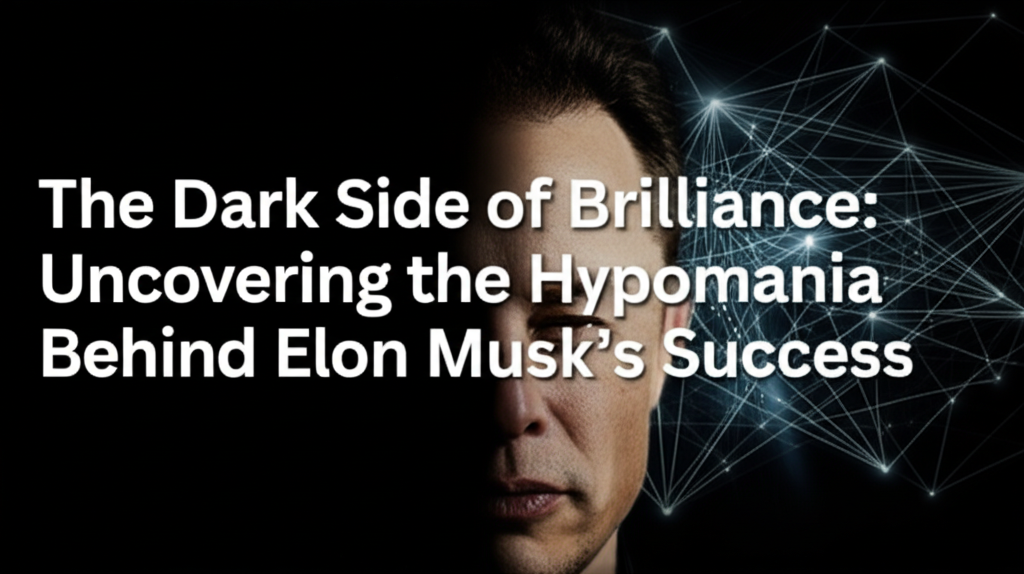When Genius Meets Manic Energy

The Dark Side of Brilliance: Uncovering the Hypomania Behind Elon Musk’s Success
In a recent appearance on Newsmax, Dr. Drew Pinsky sparked a heated debate about the mental health of public figures, specifically Tesla CEO Elon Musk. The renowned psychologist and addiction medicine expert suggested that Musk’s behavior may be indicative of hypomania, a clinical mood state that exists on the bipolar spectrum. While some may dismiss this notion as speculation, it’s essential to delve into what hypomania actually is, its potential causes, diagnosis, treatment, and why it matters – particularly in cases like Elon Musk.
What is Hypomania?
Hypomania is a mood disorder characterized by elevated or irritable mood, increased energy, and hyperactivity lasting at least four days. It sits below full mania in severity but still represents a significant deviation from normal functioning. According to the DSM-5, hypomania is one phase in bipolar II disorder and can manifest as impressive creativity or productivity, as well as impulsive and risky behavior.
Causes of Hypomania
Research suggests that genetics, neurochemical imbalance, life stress or overwork, sleep deprivation, and medication or substance use can trigger hypomanic states. Elon Musk’s high-pressure role at Tesla and SpaceX, combined with his irregular schedules and intense responsibility, frequently precipitate episodes. His well-documented case of sleep deprivation, often citing just six hours of sleep per night, is a known trigger.
Common Symptoms of Hypomania
Hypomanic behavior manifests in several recognizable ways, including:
* Elevated or irritable mood
* Decreased need for sleep, without feeling tired
* Rapid or pressured speech
* Flight of ideas, jumping between topics
* Distractibility
* Increased goal-oriented activity
* Risk-taking, such as impulsive investments or unfiltered tweets
These symptoms must persist for at least four consecutive days.
The Dark Side of Hypomania
While hypomania may be glorified as a “super-focus” or creative edge, it carries significant risks. Burnout, strained relationships triggered by irritability, impulsive financial or strategic decisions, rapid cycling into depression, and escalation into full-blown mania if untreated are all potential consequences.

Hypomania Diagnosis and Assessment
Hypomania is diagnosed via a careful psychiatric evaluation based on the DSM-5 criteria. Mental health professionals assess:
* Duration and nature of symptoms
* Functional impact on daily life
* History of episodic mood changes
* Family mental health background
* Exclusion of substance- or medication-induced symptoms
Hypomania Treatment Options
Treatment options for hypomania include:
* Medication: Mood stabilizers, atypical antipsychotics, and cautious use of antidepressants
* Psychotherapy: Cognitive Behavioral Therapy (CBT), Interpersonal and Social Rhythm Therapy (IPSRT), and psychoeducation
* Lifestyle Adjustments: Regular sleep schedules, stress reduction via mindfulness or exercise, avoidance of stimulant medications or substances, and mood tracking through apps or journals
Living with Hypomania: Can it be an Asset?
Some psychologists argue that hypomania, when mild and well-managed, can be a “productive” state, especially in high-achieving individuals like entrepreneurs or artists. People like Elon Musk, Steve Jobs, and other visionaries often display traits associated with hypomania: relentless drive, charisma, and unconventional thinking.
However, romanticizing mental health conditions can be dangerous. Without proper boundaries and treatment, hypomania can quickly spiral out of control.
As we gaze upon the towering figure of Elon Musk, it’s natural to wonder: Can a brilliant mind like his thrive without the shadow of hypomania? Or will his relentless drive ultimately prove to be his undoing?
Share your thoughts on the complex relationship between hypomania and success in the comments below.
In conclusion, the debate surrounding Elon Musk’s mental health is far from over. As we navigate the intricate landscape of bipolar spectrum disorders, it’s essential to prioritize open discussion and treatment. Only then can we hope to uncover the full extent of this enigmatic figure’s true genius – and the price that comes with it.